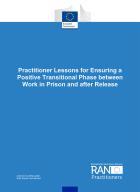Details
- Publication date
- 7 April 2023
- Author
- Directorate-General for Migration and Home Affairs
- RAN Publications Topic
- Deradicalisation/disengagement and exit work
- Foreign Terrorist Fighters and their families
- Multi-agency cooperation
- Prison and probation
- Rehabilitation
Description
How we understand and respond to terrorism is an issue that has caused very significant debate amongst academic researchers and practitioners alike. In the aftermath of 9/11, there was a flurry of activity in an effort to understand how and why the attackers perpetrated the violence, what motivated them and who supported them; a vast body of literature was produced attempting to answer these questions (Silke 2001).
As the most recent wave of violence in Europe escalated, arguably starting with the Madrid train bombings in 2004 (Iulian 2017), attempts to understand and counter terrorism continued (Schuurman, 2018), with a focus on the ideology of the perpetrators (Holbrook and Horgan, 2019), their identity (Schwartz, Dunkel and Waterman, 2009), broader social issues such as immigration (Helbling and Meierrieks, 2022) and foreign policy (Savun and Phillips, 2009) as well as mental health (Corner, Gill, Schouten and Farnham, 2018) and peer networks (Hwang, 2018).
In the years following the 9/11 attacks there was a significant increase in the number of individuals being incarcerated for terrorism and related offences and with this came concerns regarding interventions in prison (Hart, 2020), deradicalisation options, desistance from violent groups followed by the concerns regarding the potential for radicalisation contagion effect in prisons (Chantraine and Scheer, 2020; Zahn, 2016). More recently, due both to the high profile incidences of individuals perpetrating attacks who were previously in prison for terrorism offences (Hodwitz, 2019; Altier, Leonard Boyle and Horgan, 2019), there has been renewed concern regarding the risk of recidivism for terrorist offenders (Hasisi, B., Carmel, T., Weisburd, D. et al, 2020).
This has become a significant issue, predominantly because a large number of individuals incarcerated in recent years are due to be released after serving long sentences in European prisons (Silke and Morrison, 2020). In addition, there continues to be the risk and recidivism issue around individuals returning from previously held ISIS territory in Syria and Iraq, many of whom ultimately serve short sentences, as well as others who managed to return unnoticed (Malet and Hayes, 2020).

